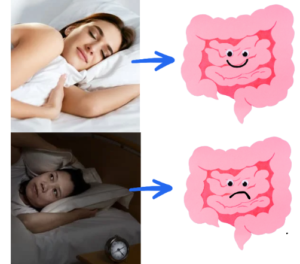Understanding the Critical Relationship Between Quality Sleep and Digestive Health
Sleep serves as more than just a period of rest; it is an essential biological function that deeply impacts our digestion and overall health. The intricate interplay between sleep and digestive wellness encompasses various physiological processes that work together seamlessly. The body’s circadian rhythm, often referred to as the internal clock, coordinates both sleep cycles and digestive functions. This synchronisation clarifies why individuals tend to experience hunger at similar times each day, demonstrating how our bodies are finely tuned to the natural biological cycles that govern essential processes.
The Importance of Quality Sleep for Optimal Digestive Functionality 
Sleep is crucial for the body's ability to heal, rejuvenate, and restore its functions. The deeper stages of sleep hold particular significance for these vital restorative processes. During these profound phases, the organs, tissues, and cells that comprise the digestive system not only relax but engage in critical repair activities. The body prioritises cellular repair and growth during deep sleep, particularly the regeneration of the cells lining the digestive tract, which endure constant wear and tear from food particles and digestive enzymes. This regeneration is vital for maintaining the integrity of the gastrointestinal lining, thereby enhancing the efficiency of digestion and overall digestive health.
Deep sleep also plays a significant role in strengthening the immune system, which is particularly important for the digestive system, as it contains its own specialised immune cells activated by beneficial bacteria populating the gut. These immune cells are essential for defending the gut and the entire digestive system against harmful microorganisms, ensuring a balanced population of bacteria within the gut environment. A strong immune response contributes to the overall health and functionality of the digestive processes.
Moreover, the organs that constitute the digestive system are instrumental in detoxification, aiding the body in eliminating waste and harmful substances. Deep sleep enhances this detoxification process by optimising the functioning of the liver and kidneys, enabling these organs to operate at their best. This collaborative relationship between sleep and detoxification is fundamental to achieving overall digestive health and wellness, highlighting the importance of restful sleep.
Understanding the Relationship Between Gut Motility and Sleep Quality
A crucial aspect of digestion is the effective movement of food and waste through the digestive tract, a process referred to as gut motility. This process undergoes significant changes during sleep. Throughout both deep and light sleep, the rate of gut motility declines markedly. This reduction occurs as a necessary adaptation, allowing the digestive system to conserve energy, which is redirected towards the repair of digestive tissues. This energy conservation mechanism enables the digestive process to operate more effectively when awake, optimising nutrient absorption and waste elimination.
The migrating motor complex signifies a cycle of contractions that occurs during fasting periods, including during sleep. This cycle is vital for maintaining gut motility, as it effectively clears away food particles and residues that may linger in the digestive system. This natural cleansing mechanism of the digestive tract minimises the risks associated with bacterial overgrowth, thereby promoting a healthy gut environment. Notably, the migrating motor complex is most actively engaged during the night when individuals are fasting and asleep, underscoring the essential role of sleep in preserving the health of the digestive system.
As dawn approaches, gut motility gradually increases, preparing the digestive system to process and digest food efficiently. This surge in motility can also trigger the first bowel movement of the day, illustrating the finely tuned connection between sleep and gut motility. Recognising this relationship is essential for optimising digestive health and enhancing overall well-being.
Investigating Hormonal Interactions Affecting Sleep and Digestive Health
Ghrelin, commonly known as the hunger hormone, plays a significant role in stimulating appetite. In contrast, leptin signals to the brain that the stomach is full, which helps prevent overeating. Together, these hormones are crucial for appetite regulation; however, their effects can be negatively influenced by insufficient sleep.
Even a single night of poor sleep can result in elevated levels of ghrelin, which may lead to increased appetite and cravings for carbohydrates. This phenomenon is often referred to as feeling ‘hangry’. To exacerbate the situation, levels of leptin can decrease after a night of inadequate sleep, disrupting the communication that indicates when we are full. This creates a challenging scenario where individuals may overindulge and make poor dietary choices, struggling to heed their body’s signals to cease eating. While occasional poor sleep may not yield severe consequences, chronic insomnia can lead to significant digestive complications, including inflammation in the gut, liver disorders, gastroesophageal reflux disease, inflammatory bowel disease, and even colorectal cancer, in addition to contributing to weight gain.
The Impact of Sleep Disruptions on Digestive Health
Disruptions to sleep can result in a range of digestive issues. Factors such as shift work, particularly night shifts, and the experience of jet lag can considerably interfere with sleep patterns, upsetting the body’s internal clock. Additionally, consuming late-night meals or having irregular eating times can detrimentally affect the quality of sleep. The circadian rhythm that regulates sleep is intricately linked to natural sunlight, which is vital for maintaining a balanced sleep-wake cycle.
Unfortunately, in our modern, technology-driven lifestyle, many individuals spend the majority of their daytime indoors, resulting in diminished exposure to natural light. This shift has led to increased exposure to blue light from devices such as computers, televisions, and smartphones, further disrupting the sleep cycle and associated patterns, particularly when this exposure occurs close to bedtime.
The cumulative effects of these factors can culminate in severe digestive issues, including diarrhea, ulcers, inflammatory bowel disease, or disruptions to the delicate balance between beneficial and pathogenic bacteria in the gut. This imbalance can also inflict damage on the gut lining, exacerbating the challenges surrounding digestive health.
Enhancing Microbiome Health Through Restorative Sleep
The microbiome encompasses the trillions of microorganisms residing in the gut, predominantly composed of beneficial bacteria known as probiotics, along with viruses, fungi, and potentially harmful bacteria. These microbes are vital not only for overall health but also for digestive wellness. They enhance immune responses and aid in digestion, facilitating the production of essential vitamins, enzymes, hormones, and amino acids. Recent studies have highlighted a significant correlation between the microbiome and sleep, revealing that disrupted sleep or chronic insomnia can negatively impact the balance of these microbes, ultimately affecting digestive health and overall well-being.
Unpacking the Complex Relationship Between Microbiome Health and Sleep
The connection between sleep and microbiome health is intricate and multifaceted. Poor sleep can negatively impact microbiome health, while an unbalanced microbiome can also detrimentally affect sleep quality. To understand this complex interaction, one study demonstrated a correlation between a higher abundance of specific bacterial types in the gut and faster sleep onset, as well as fewer nighttime awakenings. Although this article cannot explore all findings in detail, the key takeaway is that fostering a diverse and plentiful population of beneficial bacteria in the gut is vital for achieving optimal sleep, effective digestion, and maintaining overall health.
Investigating the Interconnection Between Stress, Sleep, and Digestive Well-being
A prevalent result of stress and anxiety is disrupted sleep. Conversely, these mental health challenges can also have detrimental effects on the physical health and functionality of the digestive system. This disruption can lead to altered gut motility and contribute to problems such as indigestion, ulcers, and irritable bowel syndrome. A crucial factor in this dynamic is the role of the so-called stress hormone, cortisol.
Understanding the Influence of Cortisol on Digestive Processes
When cortisol levels rise, the body responds by entering a fight-or-flight state. This physiological reaction leads to blood flow being redirected to crucial areas such as the heart, brain, lungs, and muscles, while diverting it away from the digestive system. This response prepares individuals to confront danger or escape, a reaction that was vital for survival in prehistoric times.
In modern contexts, however, stressors are often less life-threatening, encompassing financial worries, work pressures, or insufficient sleep. While temporary redirection of blood flow can be beneficial in acute situations, chronic stress can inflict harm on the digestive system, particularly concerning gut motility. This can manifest as symptoms including constipation, diarrhea, indigestion, gas, and bloating. Therefore, implementing effective stress management strategies is essential for supporting both gut health and achieving restorative sleep.
Securing adequate sleep is fundamental for maintaining a healthy digestive system, as the link between sleep and digestion is deeply interwoven. Prioritising effective sleep hygiene practices is crucial for achieving restorative sleep. This encompasses reducing exposure to blue light from electronic devices, adhering to a consistent sleep schedule, creating a conducive sleep environment that is cool and dark, avoiding food intake within two hours prior to bedtime, and ensuring ample exposure to natural light during the day, especially in the morning.
References
Understanding Digestive Health and Circadian Rhythms
Exploring Sleep Dysfunction and Digestive Conditions
Examining the Link Between the Gut Microbiome and Sleep
Investigating Stress and Its Effects on the Digestive System
The Article: How Sleep Affects Your Digestive System appeared first on https://janestevensnutrition.com
The Article: Sleep’s Impact on Your Digestive System Explained appeared first on https://janestevens.net
The Article Sleep’s Impact on Digestive Health Explained Was Found On https://limitsofstrategy.com

